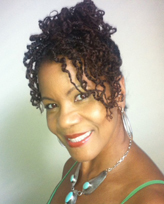
Health & Wellness Coaching
“MUIH’s wellness coaches are taught to listen and ask powerful questions during coaching sessions to help clients delve deeper than obvious symptoms to what may be underlying issues at the root of their areas of concern.”
As a Work/Life Strategies Specialist, what is your role at the University of Maryland, Baltimore (UMB)?
My role is to implement, measure, and engage employees in UMB’s corporate wellness program. This is a newly created position at UMB. The university recognized the critical need to dedicate full-time responsibilities toward maintaining the UMB initiatives of work/life balance. I believe that UMB was looking for someone with my passion and dedication to help organizations and communities obtain better health with a holistic approach. This is my dream job—it gives me a wonderful opportunity to reach goals that exceed my expectations.
Why do you feel UMB’s work/life balance initiatives are so important?
UMB is the health science university for the state of Maryland. We provide world-class health scientists to the state, nation, and world. Why not be the best in delivering those same services to our own employees? Currently UMB has a lot of decentralized wellness activities and resources, including two on-site fitness centers, a newly launched smoking cessation program, and various seminars on health and wellness. We are now in the process of capturing these great activities into one well-defined, institution-wide, and robust wellness program. Workplace wellness is vital to the successful development and productivity of employees, resulting in a stronger, healthier, and happier workforce. Employees will become more engaged and feel more appreciated because the university is invested in their well-being and work/life balance.
Did your education at Tai Sophia Institute, now Maryland University of Integrative Health, make a difference in you being hired?
According to Associate Vice President of Human Resources Services Marjorie Powell, my credentials from MUIH, coupled with my HR and benefits experience, was a huge factor in their decision to offer me the position.
What did you learn in the wellness coaching program that led you to this position?
There were so many valuable life changing lessons that I learned as a student at MUIH that inspired me to walk a personal journey towards a lifestyle of well-being. These are the top three.
- I learned to listen and to be an observer. And most importantly, I learned to listen to my body. Our bodies are wise and speak to us every moment. The body has the ability to heal itself if given the opportunity.
- I also learned you can have an illness and still be well. That was amazing for me! I now live my life mindful of my thoughts, actions, and words, and live with gratitude every day. When I am off-center, I now know I have the power to be still, breathe, and just be in the moment.
- The student is the teacher and the teacher is the student.
What is it about wellness coaching that makes a difference?
Many people are bombarded on a daily basis with conflicting messages and information when it comes to health and wellness. MUIH’s wellness coaches are taught to listen and ask powerful questions during coaching sessions to help clients delve deeper than obvious symptoms to what may be underlying issues at the root of their areas of concern.
Why isn’t it enough to just give people information?
The coach-client relationship assists the client with applying small steps they can manage based on their lifestyle. Coaching helps clients break down barriers, fears, peer pressure, and internal and external messages to achieve their wellness goals, and guides clients with tools, assessments, deep conversations, accountability, and celebrations of success. Once there is a mind shift, effective lifestyle change can take place. The mind can convince the body of the importance of resisting self-defeating habits.
Learn more about MUIH’s graduate programs in Health and Wellness Coaching.
Amanda Robinson is a 2010 graduate of the first wellness coaching program at Tai Sophia Institute, now MUIH, and holds a bachelor’s degree in business administration. In addition to her position as a Work/Life Strategies Specialist at the University of Maryland, Baltimore, she maintains a private coaching practice.